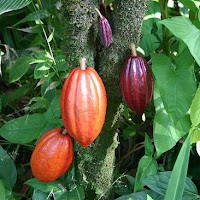A Brief Introduction of Cacao Tree
When?
Fifteen hundred years ago.
In the Central American rain forests where the tropical mix of high rain fall combined with high year round temperatures and humidity provide the ideal climate for cultivation of a plant called Cacao Tree.
Background
The Cacao Tree was worshipped by the Mayan civilisation who believed it to be of divine origin. Cacao is actually a Mayan word which means "God Food". Hence the tree's modern generic Latin name 'Theobrama Cacao' meaning ‘Food of the Gods’, but it was then corrupted into the more familiar 'Cocoa' by the early European explorers.
 |
| picture from naturalezabierta.com |
The Aztecs, like the Mayans, enjoyed Cacao as a beverage fermented from the raw beans, which featured prominently in ritual and as a luxury available only to the very wealthy. They called this drink Xocolatl, the Spanish conquistadors found this almost impossible to pronounce and so corrupted it to the easier 'Chocolat', the English further changed this to Chocolate.
From Liquid transform to Solid Chocolates
Xocolatl! or Chocolat or Chocolate as it became known, was brought to Europe by Cortez. Within a few years, the Cocoa beverage made from the powder produced in Spain had become popular throughout Europe.
It just a coincident!
The first mention of chocolate being eaten in solid form is when bakers in England began adding cocoa powder to cakes in the mid 1600's. Then in 1828 a Dutch chemist, Johannes Van Houten, invented a method of extracting the bitter tasting fat or "cocoa butter" from the roasted ground beans, his aim was to make the drink smoother and more palatable, however he unknowingly paved the way for solid chocolate as we know it. |
| picture from http://themarktrix.blogspot.com |
References:
1. A History Of Chocolate. (2004). Retrieved April 30, 2011, from aphrodite-chocolates: http://www.aphrodite-chocolates.co.uk/history_chocolate.htm
2. Bensen, A. (2008, March 1). A Brief History of Chocolate. Retrieved April 30, 2011, from smithsonianmag: http://www.smithsonianmag.com/arts-culture/brief-history-of-chocolate.html

No comments:
Post a Comment